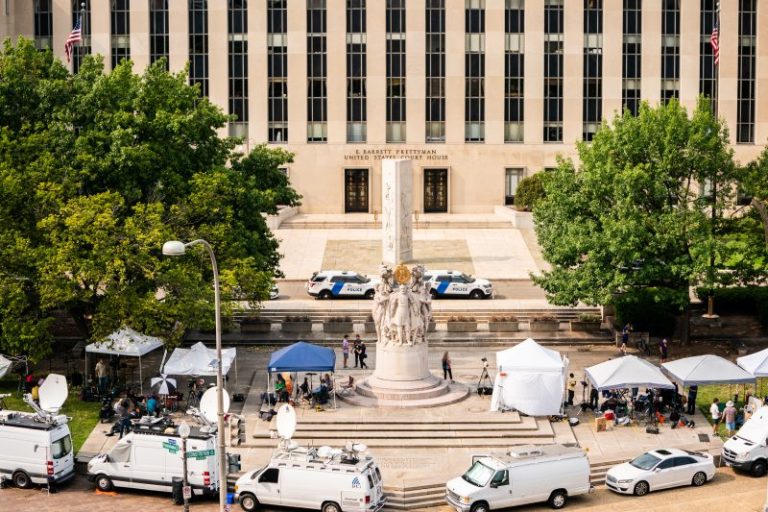With U.S. District Judge Tanya S. Chutkan as the trial judge overseeing his case in Washington, Donald Trump’s legal troubles in the Jan. 6, 2021, Capitol attack come near full circle.
Trump’s federal criminal indictment on charges of attempting to subvert the results of the 2020 presidential election was randomly assigned Tuesday to Chutkan, 61, who nearly two years ago became one of the first federal judges in D.C. to reject the former president’s efforts to use executive privilege to withhold White House communications from Jan. 6 investigators, in that instance from the House select committee investigating the Capitol riot.
In her Trump documents opinion on Nov. 9, 2021, Chutkan ruled that Congress had a strong public interest in obtaining White House communications and other records that could shed light on the violent attack by a mob of Trump supporters who injured dozens of police, ransacked offices and forced the evacuation of lawmakers meeting to confirm the results of the 2020 election. Chutkan noted that President Biden had waived executive privilege, overcoming his predecessor’s attempt to invoke the confidentiality of presidential communications, a ruling affirmed by a federal appeals court and left undisturbed by the U.S. Supreme Court.
“At bottom, this is a dispute between a former and incumbent President,” Chutkan wrote. “And the Supreme Court has already made clear that in such circumstances, the incumbent’s view is accorded greater weight.”
History of investigations involving Donald Trump
1/7
End of carousel
Chutkan agreed with the House that the matter was of “unsurpassed public importance because such information relates to our core democratic institutions and the public’s confidence in them” and could help lead to legislation “to prevent such events from ever occurring again.”
About 13 months later, the House committee referred Trump to the Justice Department for criminal charges. And two and a half years after the Jan. 6 attack, a grand jury indicted Trump on Tuesday, charging him with trying to overturn the results of the 2020 election.
Trump is scheduled to make his first appearance Thursday before a magistrate judge in U.S. District Court in Washington, and after that, Chutkan will take over the case, facing enormous scrutiny over the high-profile case.
Chutkan was appointed to the U.S. bench in 2014 by President Barack Obama and was one of the first public defenders appointed to the federal trial court in Washington. A trained dancer raised in Kingston, Jamaica, Chutkan graduated from George Washington University and the University of Pennsylvania Law School before working in private practice with two Washington firms and serving 11 years with the D.C. Public Defender Service. She then joined the Boies Schiller Flexner law firm, where as partner she was a white-collar defense specialist focusing on complex antitrust class-action cases.
“For a lot of people, I seem to check a lot of boxes: immigrant, woman, Black, Asian. Your qualifications are always going to be subject to criticism and you have to develop a thick skin,” Chutkan was quoted as saying in a February 2022 profile posted by the federal judiciary.
The featured speaker at an African American History Month event hosted by the judiciary’s Defender Services Office, Chutkan cited “the dignity and the brilliance” of former federal judge and NAACP Legal Defense Fund litigator Constance Baker Motley and her predecessors as a model. “They put their lives on the line every time they did their jobs and had to put up with far more than I have,” she said.
Chutkan has been the toughest sentencing judge on the D.C. federal court for Jan. 6 defendants, according to a Washington Post database. Through mid-June, Chutkan sentenced every one of the 31 defendants to have come before her to at least some jail or prison time. She has exceeded prosecutors’ sentencing recommendations nine times and granted them 14 times, while court-wide, judges have sentenced below government recommendation about 80 percent of the time.
“It has to be made clear that trying to violently overthrow the government, trying to stop the peaceful transition of power and assaulting law enforcement officers in that effort, is going to be met with absolutely certain punishment,” Chutkan has explained from the bench.
Alluding to Trump’s role in the events, Chutkan said at another defendant’s sentencing: He “did not go to the United States Capitol out of any love for our country. … He went for one man.”
Chutkan said during the federal defender event that she drew inspiration from young people.
“Young people inspire me in their openness, in their tolerance, and in their desire to fight injustice,” she was quoted as saying. “I can’t let them down. I have to be an example to them.”
This is a developing story and will be updated.

